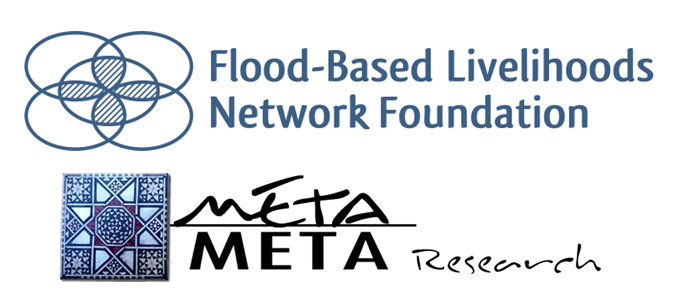Dear Spate Friends,
We hope all is fine wherever you are.
We have a couple of things we would like to inform you about:
Codifying water rights in contested basins of Afghanistan
Under the NWO research project “Codifying water rights in contested basins of Afghanistan”, the Spate Irrigation Network Foundation, UNESCO-IHE and Kabul University will investigate the existing water rights, distribution rules and governance system of spate irrigated areas in Nimroz, Afghanistan. From this, a guidance document shall be created – with the involvement of the local stakeholders – to codify the spate water rights and distribution rules of three areas of this province. Codifying water distribution rules clarifies and completes local water management arrangements and introduces a neutral factor in resolving disputes. This will strengthen the provision of security & rule of law through water rights and security in contested basins of Afghanistan.
Short Course “Flood-Based Farming Systems and Water Harvesting for Food Security” postponed
The short course “Flood-Based Farming Systems and Water Harvesting for Food Security” at UNESCO-IHE has been postponed to November 2 -13, 2015. Application for the course needs to be done at UNESCO-IHE before October 2, 2015. For more information, check the website of UNESCO-IHE: https://www.unesco-ihe.org/flood-based-farming-systems-and-water-harvesting-food-security
Publication on WUAs in Gash Delta, Sudan
In many countries, water user associations (WUAs) have assumed responsibility for managing irrigation systems, but their performance is known to vary markedly. This study assessed WUAs in the Gash spate irrigation project in Sudan, a decade after their initiation. Fieldwork involved a farmer survey, focus group discussions, benchmarking, and interviews with key informants.
http://spate-irrigation.org/wp-content/uploads/2015/08/150812_Assessing-performance-WUA-in-GASH.pdf
Managing Prosopis Juliflora for better (agro-) pastoral Livelihoods in the Horn of Africa: Proceedings of the Regional Conference
In May 2014, GIZ, Mekelle University (Ethiopia), the UNESCO-IHE Institute for Water Education (Netherlands) and the Spate Irrigation Network Foundation jointly organized a regional conference on Prosopis juliflora for the Horn of Africa. The conference proceedings publication below summarizes the presentations held and the results of the fruitful discussions during the 2-day conference.
Managing Prosopis Juliflora for better (agro-) pastoral Livelihoods in the Horn of Africa
Flood based farming Ethiopia
Several reports from Mekelle University about flood based farming practices in Ethiopia have recently been published on the website:
Flood Based Farming Practices Tigray, Status and potential:
This report encompasses the current status of Flood base farming development, summarizes the experiences so far and formulates a number of recommendations on the development of this upcoming resource management system. It first discusses the status and spate irrigation in the Raya valley then goes to the potential there is and the different techniques of flood based farming practising in Tigray.
Assessment of the Potential of Flood-Based Farming in Ethiopia:
The objective of the study is to assess the potential irrigable area using spate in Afar region, Amhara region, Benishangul-Gumuz region, Oromia region, and Southern Nations, Nationalities and People’s Region (SNNPR).
Multi Reservoir Operation and Challenges of the Omo River Basin: Part II: Potential Assessment of Flood Based Farming on lower Omo Ghibe Basin:
The objective of this research was to evaluate the impact of the upstream interventions on the downstream Flood-based farming practices in the Omo Ghibe basin.
One thousand and one intermittent rivers
Marshalling scientists from around the world to voluntarily focus on intermittent rivers – this is the madcap project launched by a Irstea researcher Thibault Datry. The aim is to improve knowledge of these rivers that are dry for part of the year, thereby addressing the present lack of data. It is a project without funding that uses volunteer researchers. Currently, 80 laboratories are involved in almost 25 countries from Namibia to Antarctica, and even including Ecuador and India. It is expected that around 400 rivers will be included across all continents.
For more information about the project see the link: http://www.irstea.fr/en/all-news/water-department/1000-intermittent-rivers-climate-change
2 Notes translated in Sindhi, Pakistan
2 Spate Notes, The use of minor crops in spate irrigation and Potential for spate irrigation in Pakistan have been translated to Sindhi. This has been done by our local partner Research and Development Foundation (RDF). They have circulated to farmers including women groups, academia, research organization, donors, NGOs and government agencies in the country.
Wishing you the best,
Abraham, Frank, Matthijs and Linda
